# CDDFuse
Codes for ***CDDFuse: Correlation-Driven Dual-Branch Feature Decomposition for Multi-Modality Image Fusion. (CVPR 2023)***
[Zixiang Zhao](https://zhaozixiang1228.github.io/), [Haowen Bai](), [Jiangshe Zhang](http://gr.xjtu.edu.cn/web/jszhang), [Yulun Zhang](https://yulunzhang.com/), [Shuang Xu](https://shuangxu96.github.io/), [Zudi Lin](https://zudi-lin.github.io/), [Radu Timofte](https://www.informatik.uni-wuerzburg.de/computervision/home/) and [Luc Van Gool](https://vision.ee.ethz.ch/people-details.OTAyMzM=.TGlzdC8zMjQ4LC0xOTcxNDY1MTc4.html).
-[*[Paper]*](https://openaccess.thecvf.com/content/CVPR2023/html/Zhao_CDDFuse_Correlation-Driven_Dual-Branch_Feature_Decomposition_for_Multi-Modality_Image_Fusion_CVPR_2023_paper.html)
-[*[ArXiv]*](https://arxiv.org/abs/2104.06977)
-[*[Supplementary Materials]*](https://openaccess.thecvf.com/content/CVPR2023/supplemental/Zhao_CDDFuse_Correlation-Driven_Dual-Branch_CVPR_2023_supplemental.pdf)
## Update
- [2023/5] Training codes and config files will be public available before June.
- [2023/4] Release inference code for infrared-visible image fusion and medical image fusion.
## Citation
```
@InProceedings{Zhao_2023_CVPR,
author = {Zhao, Zixiang and Bai, Haowen and Zhang, Jiangshe and Zhang, Yulun and Xu, Shuang and Lin, Zudi and Timofte, Radu and Van Gool, Luc},
title = {CDDFuse: Correlation-Driven Dual-Branch Feature Decomposition for Multi-Modality Image Fusion},
booktitle = {Proceedings of the IEEE/CVF Conference on Computer Vision and Pattern Recognition (CVPR)},
month = {June},
year = {2023},
pages = {5906-5916}
}
```
## Abstract
Multi-modality (MM) image fusion aims to render fused images that maintain the merits of different modalities, e.g., functional highlight and detailed textures. To tackle the challenge in modeling cross-modality features and decomposing desirable modality-specific and modality-shared features, we propose a novel Correlation-Driven feature Decomposition Fusion (CDDFuse) network. Firstly, CDDFuse uses Restormer blocks to extract cross-modality shallow features. We then introduce a dual-branch Transformer-CNN feature extractor with Lite Transformer (LT) blocks leveraging long-range attention to handle low-frequency global features and Invertible Neural Networks (INN) blocks focusing on extracting high-frequency local information. A correlation-driven loss is further proposed to make the low-frequency features correlated while the high-frequency features uncorrelated based on the embedded information. Then, the LT-based global fusion and INN-based local fusion layers output the fused image. Extensive experiments demonstrate that our CDDFuse achieves promising results in multiple fusion tasks, including infrared-visible image fusion and medical image fusion. We also show that CDDFuse can boost the performance in downstream infrared-visible semantic segmentation and object detection in a unified benchmark.
## Usage
### Network Architecture
Our CDDFuse is implemented in ``net.py``.
### Testing
Pretrained models are available in ``'./models/CDDFuse_IVF.pth'`` and ``'./models/CDDFuse_MIF.pth'``, which are responsible for the Infrared-Visible Fusion (IVF) and Medical Image Fusion (MIF) tasks, respectively.
The test datasets used in the paper have been stored in ``'./test_img/RoadScene'``, ``'./test_img/TNO'`` for IVF, ``'./test_img/MRI_CT'``, ``'./test_img/MRI_PET'`` and ``'./test_img/MRI_SPECT'`` for MIF.
Unfortunately, since the size of **MSRS dataset** for IVF is 500+MB, we can not upload it for exhibition. It can be downloaded via [this link](https://github.com/Linfeng-Tang/MSRS). The other datasets contain all the test images.
If you want to infer with our CDDFuse and obtain the fusion results in our paper, please run ``'test_IVF.py'`` for IVF and ``'test_MIF.py'`` for MIF.
The testing results will be printed in the terminal.
The output for ``'test_IVF.py'`` is:
```
================================================================================
The test result of TNO :
EN SD SF MI SCD VIF Qabf SSIM
CDDFuse 7.12 46.0 13.15 2.19 1.76 0.77 0.54 1.03
================================================================================
================================================================================
The test result of RoadScene :
EN SD SF MI SCD VIF Qabf SSIM
CDDFuse 7.44 54.67 16.36 2.3 1.81 0.69 0.52 0.98
================================================================================
```
which can match the results in Table 1 in our original paper.
The output for ``'test_MIF.py'`` is:
```
================================================================================
The test result of MRI_CT :
EN SD SF MI SCD VIF Qabf SSIM
CDDFuse_IVF 4.83 88.59 33.83 2.24 1.74 0.5 0.59 1.31
CDDFuse_MIF 4.88 79.17 38.14 2.61 1.41 0.61 0.68 1.34
================================================================================
================================================================================
The test result of MRI_PET :
EN SD SF MI SCD VIF Qabf SSIM
CDDFuse_IVF 4.23 81.69 28.04 1.87 1.82 0.66 0.65 1.46
CDDFuse_MIF 4.22 70.74 29.57 2.03 1.69 0.71 0.71 1.49
================================================================================
================================================================================
The test result of MRI_SPECT :
EN SD SF MI SCD VIF Qabf SSIM
CDDFuse_IVF 3.91 71.81 20.66 1.9 1.87 0.65 0.68 1.45
CDDFuse_MIF 3.9 58.31 20.87 2.49 1.35 0.97 0.78 1.48
================================================================================
```
which can match the results in Table 5 in our original paper.
### Training
**1. Virtual Environment**
```
# create virtual environment
conda create -n cddfuse python=3.8.10
conda activate cddfuse
# select pytorch version yourself
# install cddfuse requirements
pip install -r requirements.txt
```
**2. Data Preparation**
Download the MSRS dataset from [this link](https://github.com/Linfeng-Tang/MSRS) and place it in the folder ``'./MSRS_train``.
**3. Pre-Processing**
Run
```python dataprocessing.py``` and the processed training dataset is in ``'./data/MSRS_train_imgsize_128_stride_200.h5``.
**4. CDDFuse Training**
Run ```python train.py``` and the trained model is available in ``'./models/'``.
## CDDFuse
### Illustration of our CDDFuse model.
 ### Qualitative fusion results.
### Qualitative fusion results.

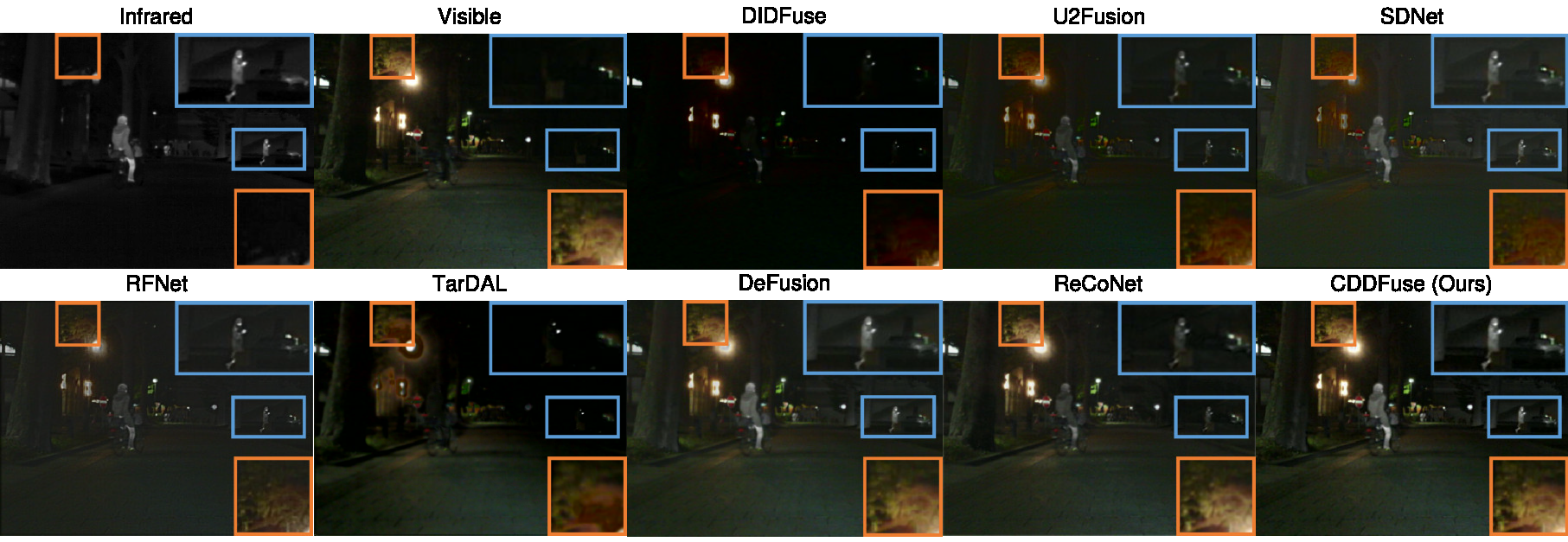
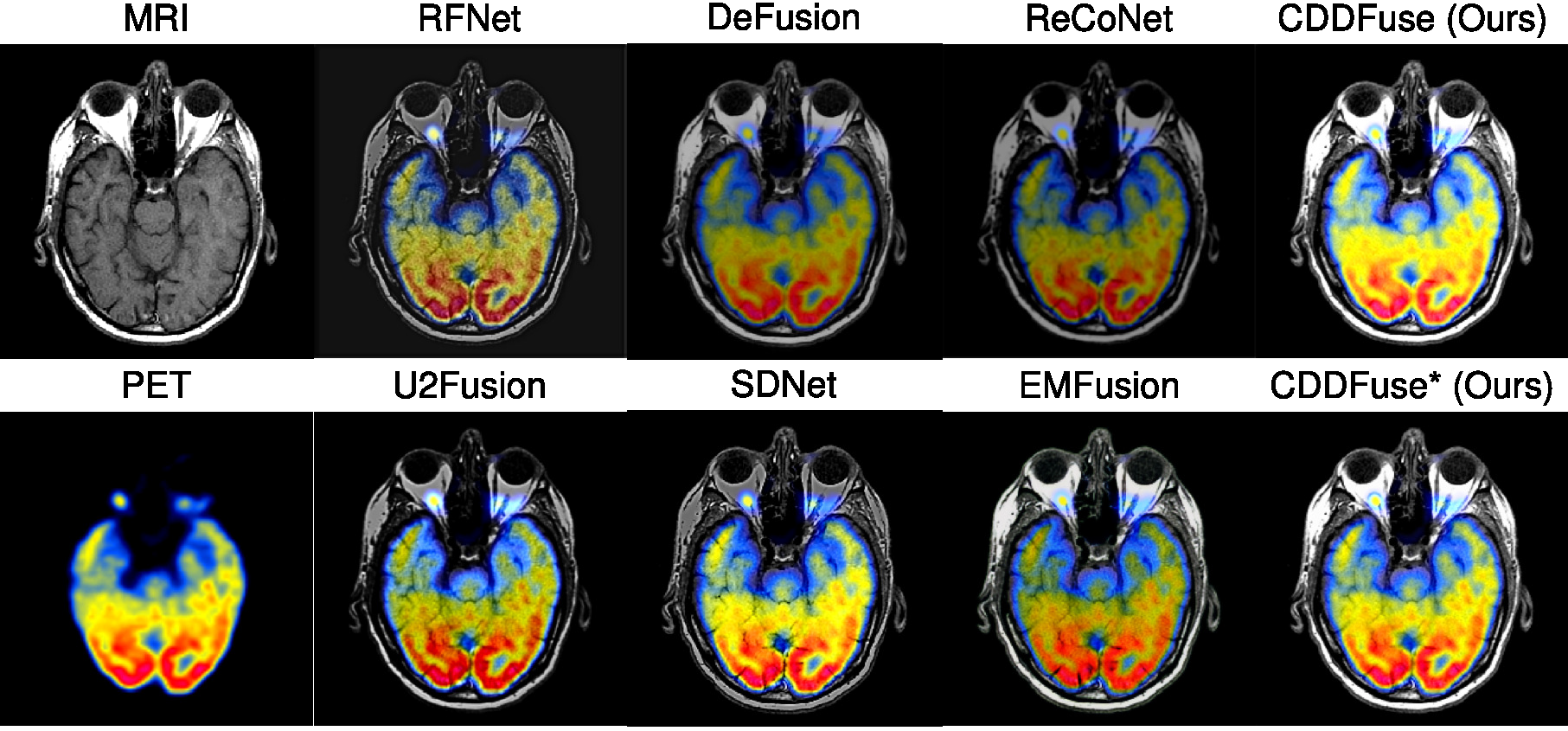 ### Quantitative fusion results.
Infrared-Visible Image Fusion
### Quantitative fusion results.
Infrared-Visible Image Fusion
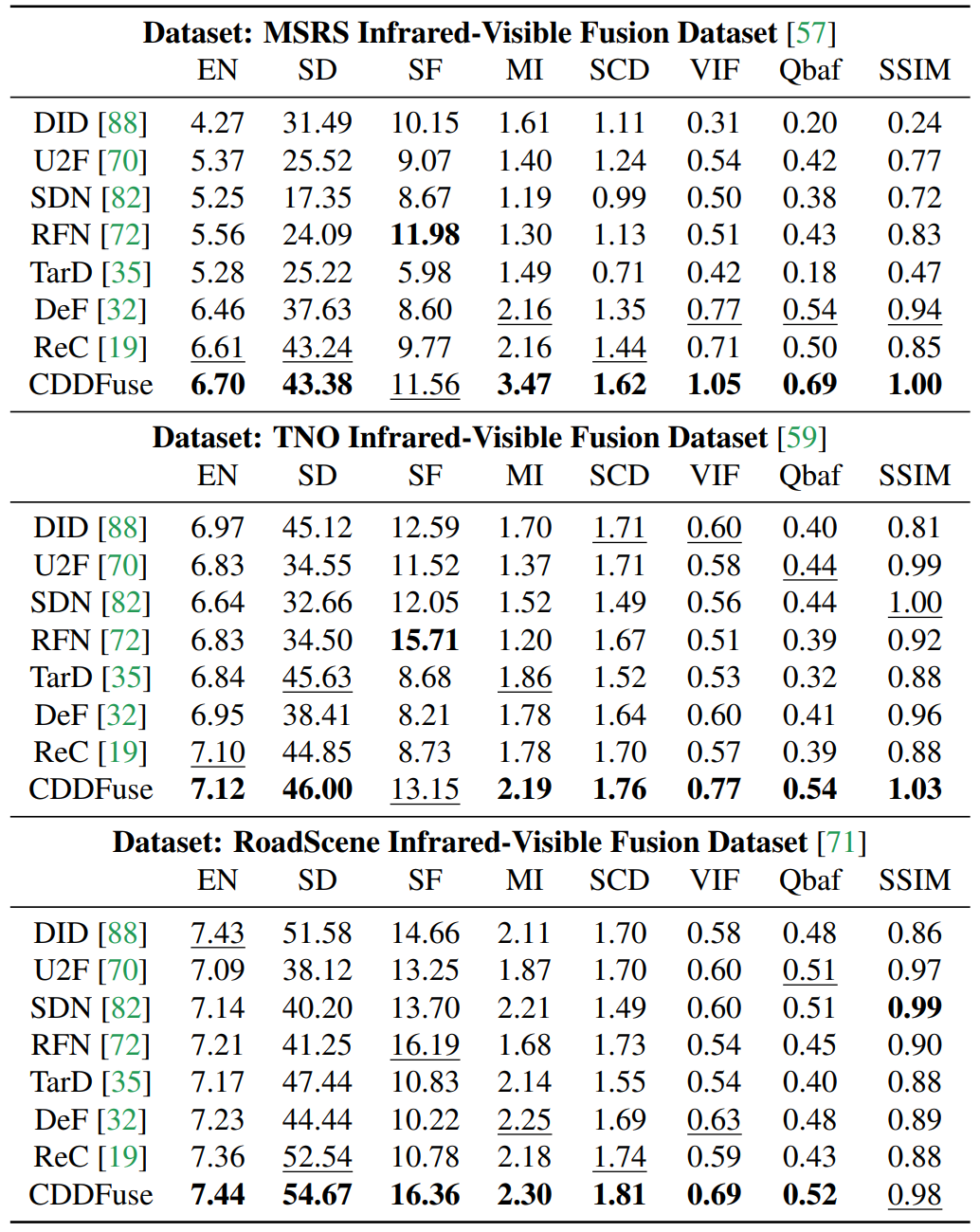 Medical Image Fusion
Medical Image Fusion
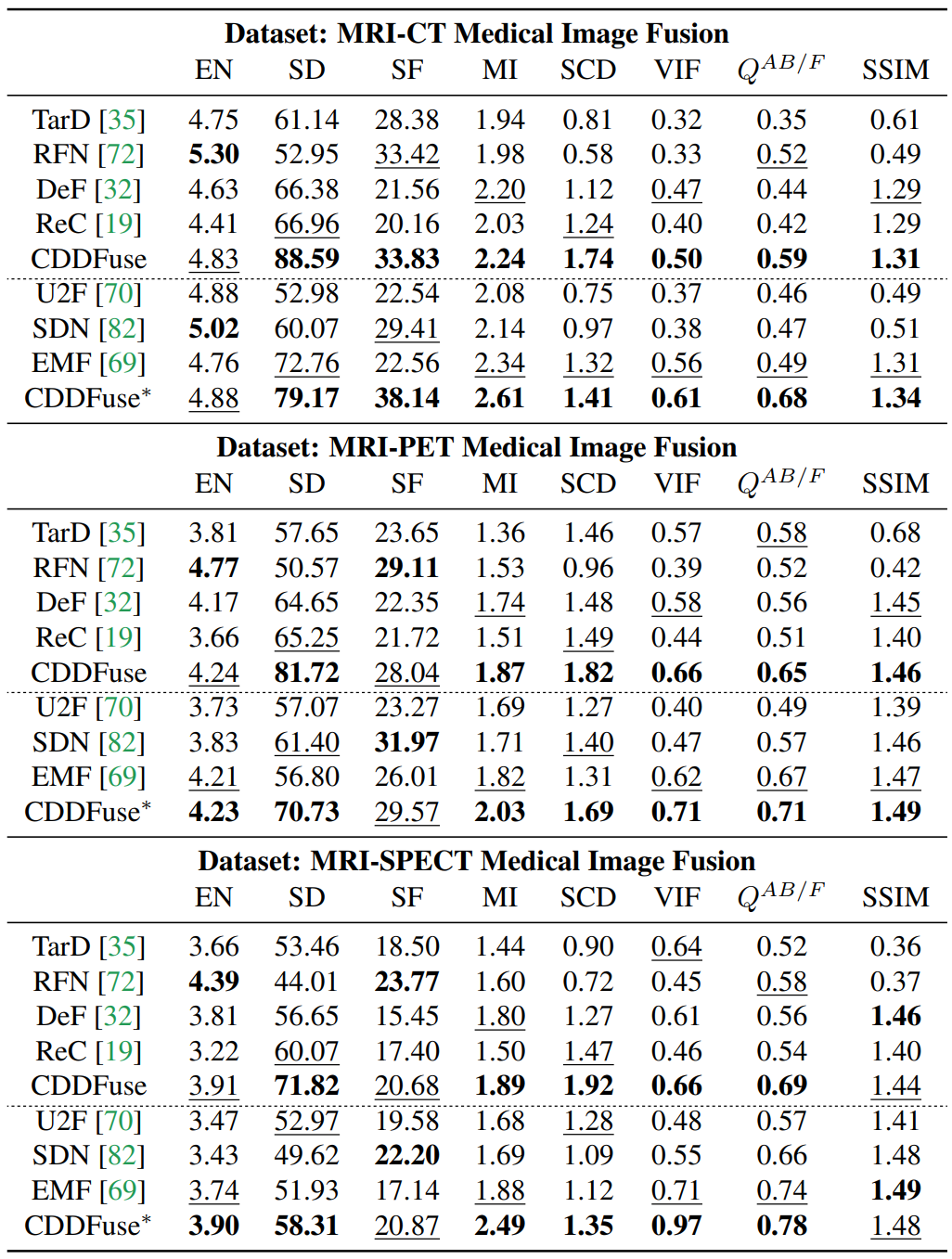 MM detection
MM detection
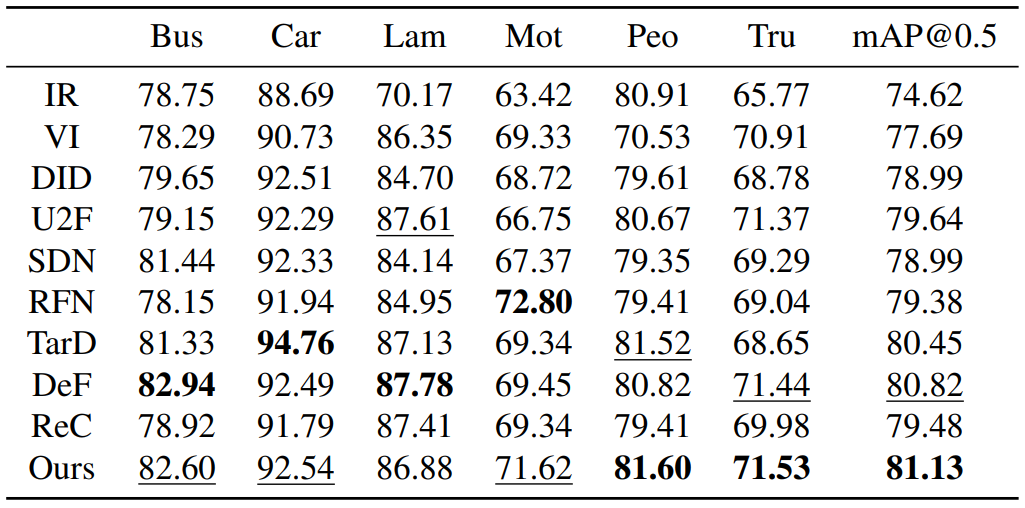 MM segmentation
MM segmentation
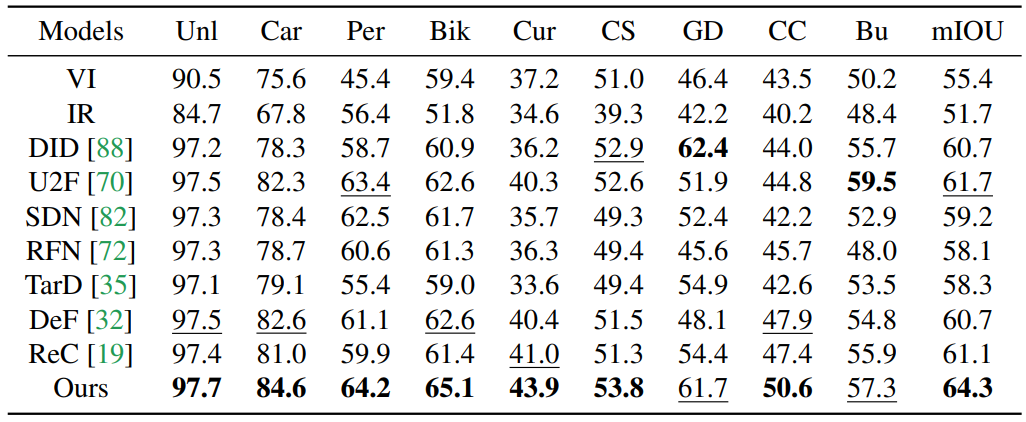 ## Related Work
- Zixiang Zhao, Haowen Bai, Jiangshe Zhang, Yulun Zhang, Kai Zhang, Shuang Xu, Dongdong Chen, Radu Timofte, Luc Van Gool. *Equivariant Multi-Modality Image Fusion.* **arXiv:2305.11443**, https://arxiv.org/abs/2305.11443
- Zixiang Zhao, Haowen Bai, Yuanzhi Zhu, Jiangshe Zhang, Shuang Xu, Yulun Zhang, Kai Zhang, Deyu Meng, Radu Timofte, Luc Van Gool.
*DDFM: Denoising Diffusion Model for Multi-Modality Image Fusion.* **arXiv:2303.06840**, https://arxiv.org/abs/2303.06840
- Zixiang Zhao, Shuang Xu, Chunxia Zhang, Junmin Liu, Jiangshe Zhang and Pengfei Li. *DIDFuse: Deep Image Decomposition for Infrared and Visible Image Fusion.* **IJCAI 2020**, https://www.ijcai.org/Proceedings/2020/135.
- Zixiang Zhao, Shuang Xu, Jiangshe Zhang, Chengyang Liang, Chunxia Zhang and Junmin Liu. *Efficient and Model-Based Infrared and Visible Image Fusion via Algorithm Unrolling.* **IEEE Transactions on Circuits and Systems for Video Technology 2021**, https://ieeexplore.ieee.org/document/9416456.
- Zixiang Zhao, Jiangshe Zhang, Haowen Bai, Yicheng Wang, Yukun Cui, Lilun Deng, Kai Sun, Chunxia Zhang, Junmin Liu, Shuang Xu. *Deep Convolutional Sparse Coding Networks for Interpretable Image Fusion.* **CVPR Workshop 2023**. https://robustart.github.io/long_paper/26.pdf.
- Zixiang Zhao, Shuang Xu, Chunxia Zhang, Junmin Liu, Jiangshe Zhang. *Bayesian fusion for infrared and visible images.* **Signal Processing**, https://doi.org/10.1016/j.sigpro.2020.107734.
## Related Work
- Zixiang Zhao, Haowen Bai, Jiangshe Zhang, Yulun Zhang, Kai Zhang, Shuang Xu, Dongdong Chen, Radu Timofte, Luc Van Gool. *Equivariant Multi-Modality Image Fusion.* **arXiv:2305.11443**, https://arxiv.org/abs/2305.11443
- Zixiang Zhao, Haowen Bai, Yuanzhi Zhu, Jiangshe Zhang, Shuang Xu, Yulun Zhang, Kai Zhang, Deyu Meng, Radu Timofte, Luc Van Gool.
*DDFM: Denoising Diffusion Model for Multi-Modality Image Fusion.* **arXiv:2303.06840**, https://arxiv.org/abs/2303.06840
- Zixiang Zhao, Shuang Xu, Chunxia Zhang, Junmin Liu, Jiangshe Zhang and Pengfei Li. *DIDFuse: Deep Image Decomposition for Infrared and Visible Image Fusion.* **IJCAI 2020**, https://www.ijcai.org/Proceedings/2020/135.
- Zixiang Zhao, Shuang Xu, Jiangshe Zhang, Chengyang Liang, Chunxia Zhang and Junmin Liu. *Efficient and Model-Based Infrared and Visible Image Fusion via Algorithm Unrolling.* **IEEE Transactions on Circuits and Systems for Video Technology 2021**, https://ieeexplore.ieee.org/document/9416456.
- Zixiang Zhao, Jiangshe Zhang, Haowen Bai, Yicheng Wang, Yukun Cui, Lilun Deng, Kai Sun, Chunxia Zhang, Junmin Liu, Shuang Xu. *Deep Convolutional Sparse Coding Networks for Interpretable Image Fusion.* **CVPR Workshop 2023**. https://robustart.github.io/long_paper/26.pdf.
- Zixiang Zhao, Shuang Xu, Chunxia Zhang, Junmin Liu, Jiangshe Zhang. *Bayesian fusion for infrared and visible images.* **Signal Processing**, https://doi.org/10.1016/j.sigpro.2020.107734.
 ### Qualitative fusion results.
### Qualitative fusion results.


 ### Quantitative fusion results.
Infrared-Visible Image Fusion
### Quantitative fusion results.
Infrared-Visible Image Fusion
 Medical Image Fusion
Medical Image Fusion
 MM detection
MM detection
 MM segmentation
MM segmentation
 ## Related Work
- Zixiang Zhao, Haowen Bai, Jiangshe Zhang, Yulun Zhang, Kai Zhang, Shuang Xu, Dongdong Chen, Radu Timofte, Luc Van Gool. *Equivariant Multi-Modality Image Fusion.* **arXiv:2305.11443**, https://arxiv.org/abs/2305.11443
- Zixiang Zhao, Haowen Bai, Yuanzhi Zhu, Jiangshe Zhang, Shuang Xu, Yulun Zhang, Kai Zhang, Deyu Meng, Radu Timofte, Luc Van Gool.
*DDFM: Denoising Diffusion Model for Multi-Modality Image Fusion.* **arXiv:2303.06840**, https://arxiv.org/abs/2303.06840
- Zixiang Zhao, Shuang Xu, Chunxia Zhang, Junmin Liu, Jiangshe Zhang and Pengfei Li. *DIDFuse: Deep Image Decomposition for Infrared and Visible Image Fusion.* **IJCAI 2020**, https://www.ijcai.org/Proceedings/2020/135.
- Zixiang Zhao, Shuang Xu, Jiangshe Zhang, Chengyang Liang, Chunxia Zhang and Junmin Liu. *Efficient and Model-Based Infrared and Visible Image Fusion via Algorithm Unrolling.* **IEEE Transactions on Circuits and Systems for Video Technology 2021**, https://ieeexplore.ieee.org/document/9416456.
- Zixiang Zhao, Jiangshe Zhang, Haowen Bai, Yicheng Wang, Yukun Cui, Lilun Deng, Kai Sun, Chunxia Zhang, Junmin Liu, Shuang Xu. *Deep Convolutional Sparse Coding Networks for Interpretable Image Fusion.* **CVPR Workshop 2023**. https://robustart.github.io/long_paper/26.pdf.
- Zixiang Zhao, Shuang Xu, Chunxia Zhang, Junmin Liu, Jiangshe Zhang. *Bayesian fusion for infrared and visible images.* **Signal Processing**, https://doi.org/10.1016/j.sigpro.2020.107734.
## Related Work
- Zixiang Zhao, Haowen Bai, Jiangshe Zhang, Yulun Zhang, Kai Zhang, Shuang Xu, Dongdong Chen, Radu Timofte, Luc Van Gool. *Equivariant Multi-Modality Image Fusion.* **arXiv:2305.11443**, https://arxiv.org/abs/2305.11443
- Zixiang Zhao, Haowen Bai, Yuanzhi Zhu, Jiangshe Zhang, Shuang Xu, Yulun Zhang, Kai Zhang, Deyu Meng, Radu Timofte, Luc Van Gool.
*DDFM: Denoising Diffusion Model for Multi-Modality Image Fusion.* **arXiv:2303.06840**, https://arxiv.org/abs/2303.06840
- Zixiang Zhao, Shuang Xu, Chunxia Zhang, Junmin Liu, Jiangshe Zhang and Pengfei Li. *DIDFuse: Deep Image Decomposition for Infrared and Visible Image Fusion.* **IJCAI 2020**, https://www.ijcai.org/Proceedings/2020/135.
- Zixiang Zhao, Shuang Xu, Jiangshe Zhang, Chengyang Liang, Chunxia Zhang and Junmin Liu. *Efficient and Model-Based Infrared and Visible Image Fusion via Algorithm Unrolling.* **IEEE Transactions on Circuits and Systems for Video Technology 2021**, https://ieeexplore.ieee.org/document/9416456.
- Zixiang Zhao, Jiangshe Zhang, Haowen Bai, Yicheng Wang, Yukun Cui, Lilun Deng, Kai Sun, Chunxia Zhang, Junmin Liu, Shuang Xu. *Deep Convolutional Sparse Coding Networks for Interpretable Image Fusion.* **CVPR Workshop 2023**. https://robustart.github.io/long_paper/26.pdf.
- Zixiang Zhao, Shuang Xu, Chunxia Zhang, Junmin Liu, Jiangshe Zhang. *Bayesian fusion for infrared and visible images.* **Signal Processing**, https://doi.org/10.1016/j.sigpro.2020.107734.